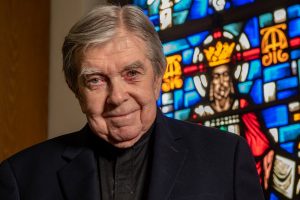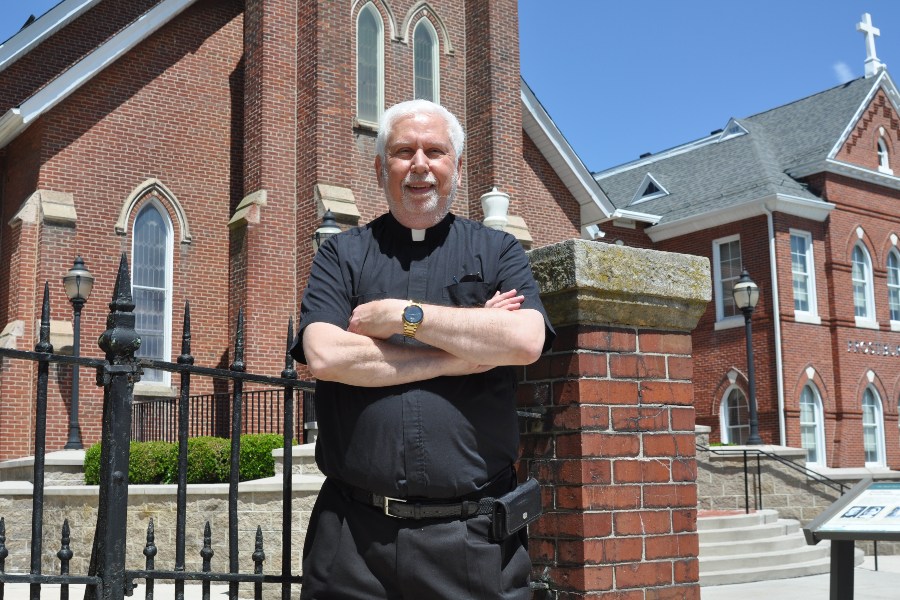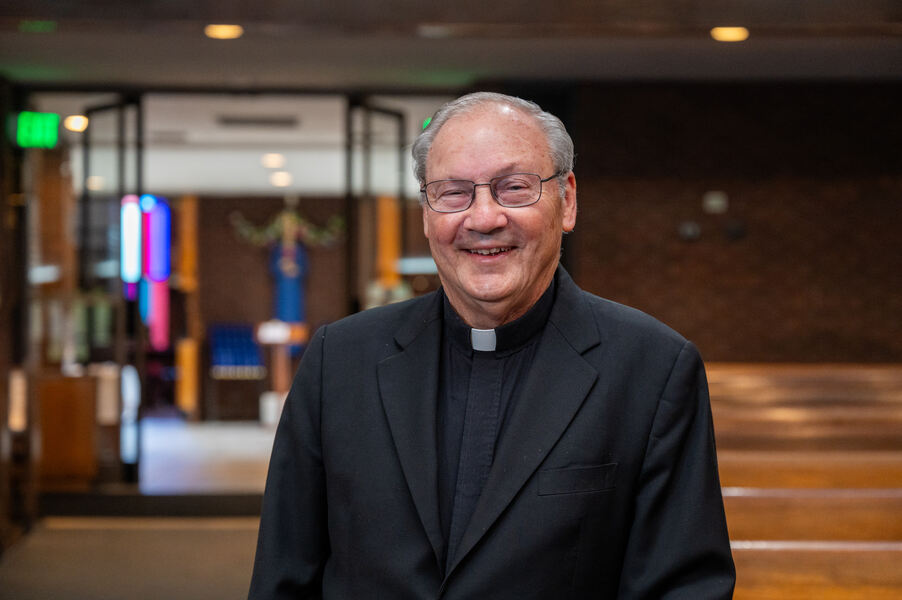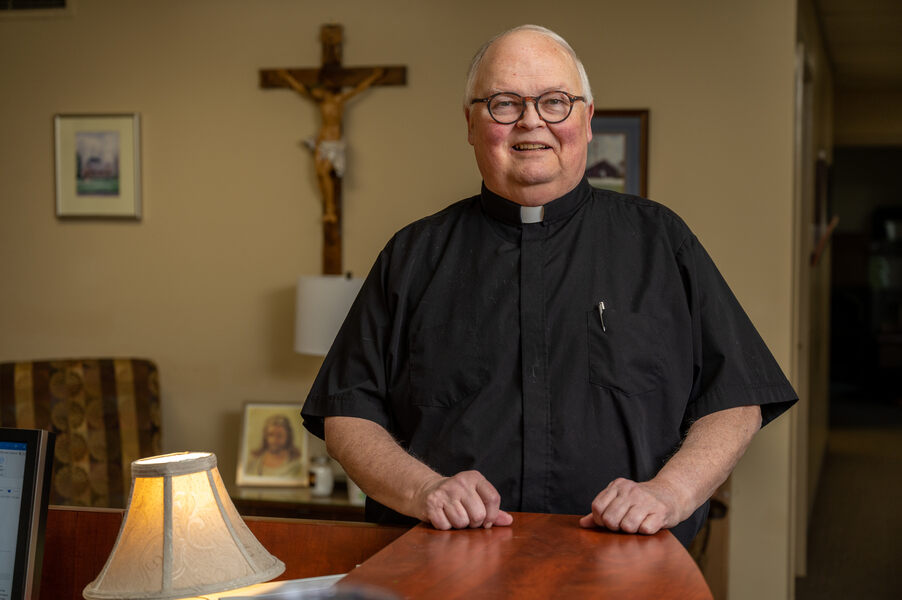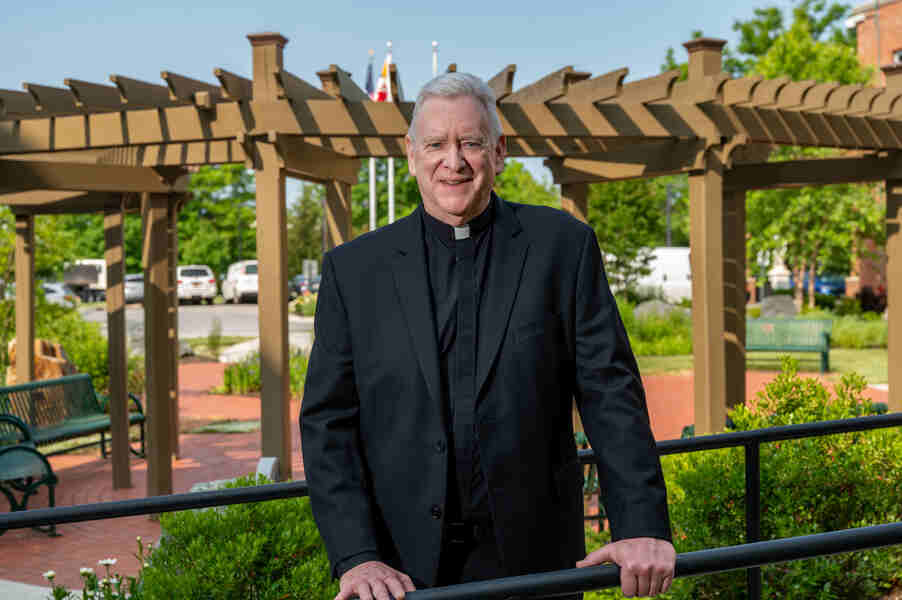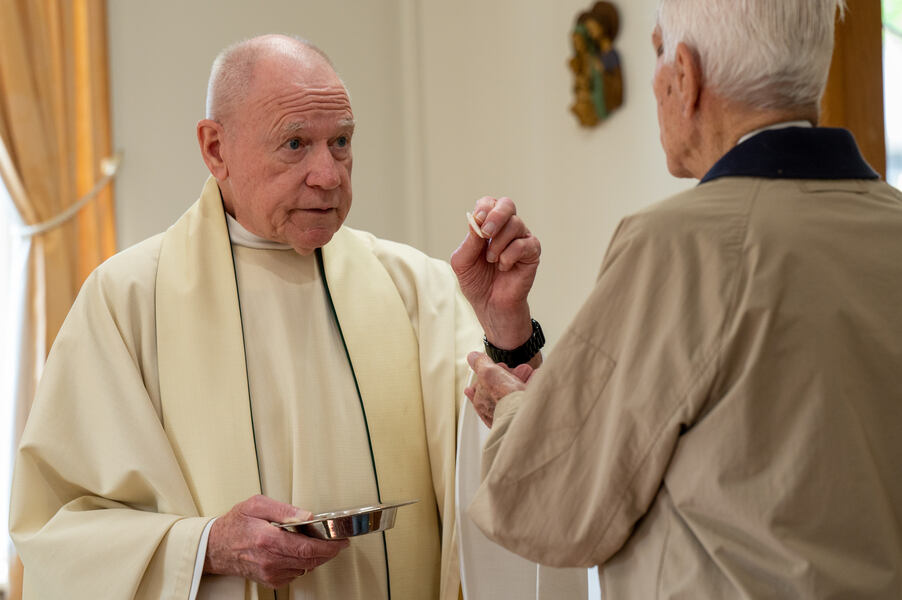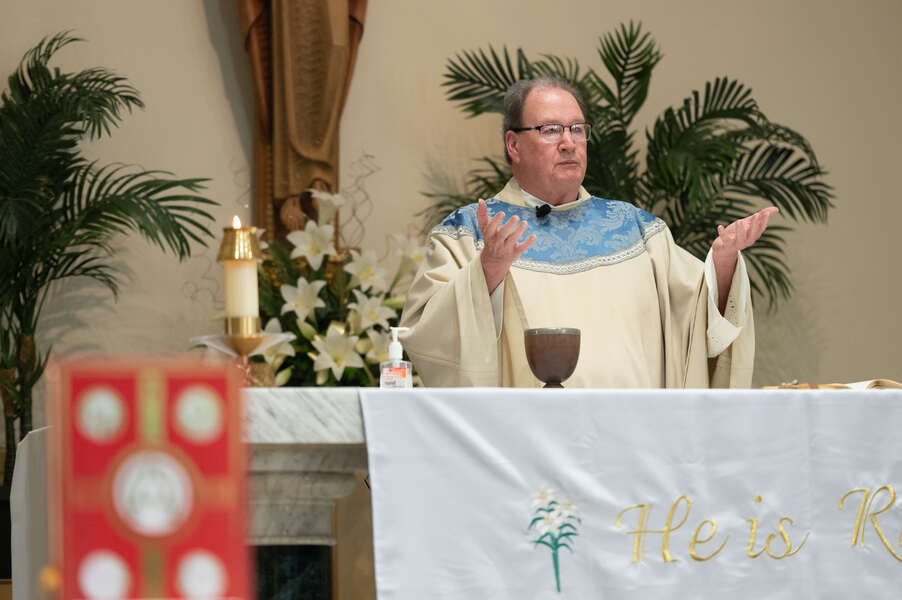Note: Six priests of the Archdiocese of Baltimore who have combined for nearly 300 years of ministry will be retiring July 1. The Review profiles the six as their parishes bid them farewell.
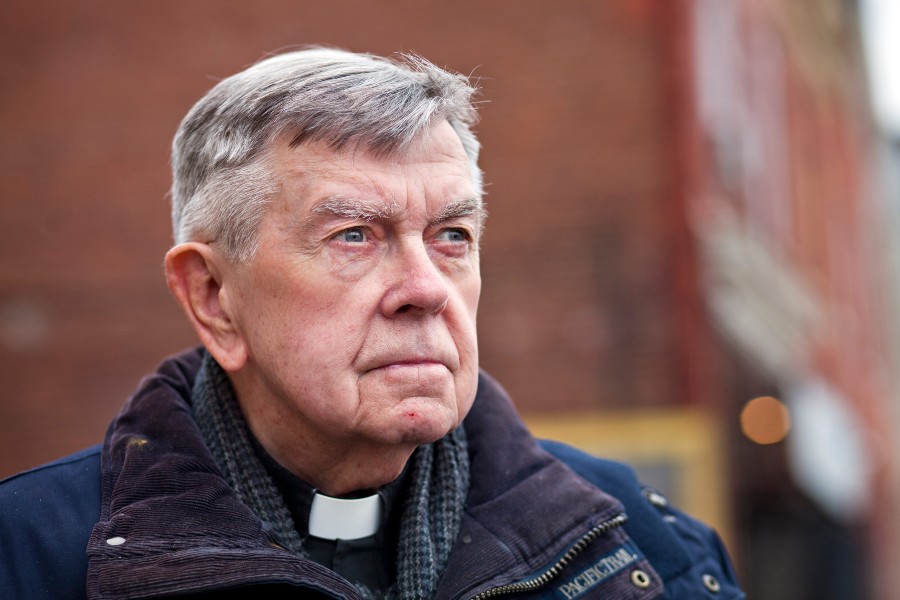
A childhood memory illuminates the vocation of the oldest pastor in the Archdiocese of Baltimore.
Monsignor William F. Burke grew up in the Park Heights neighborhood of Northwest Baltimore, in the midst of a Great Depression and then a World War. One day his friends, Catholic and Jew alike, were stopped by a sight they came upon near Park Circle.
“We went to play ball, and there was a flock of sheep and a shepherd,” he shared in a recent homily. “The Good Shepherd, that’s a powerful image. We’re called to carry on the work of the Shepherd: Everyone counts; everyone is important; no one is unimportant.
“Be available, to serve as an extension of Jesus.”
A few days later, Monsignor Burke was asked to further explain his affinity for social justice.
“You’ve heard of the Ten Commandments and you’ve heard of the spiritual and corporal works of mercy that sort of define the Beatitudes,” he said. “It’s all right there. How do you live it out?
“You knew you weren’t ordained just to celebrate Mass each day and take Communion to sick people. You were there beyond that, to listen, to understand, to be patient, but also, I think, to be effective in bringing about change.”
Monsignor Burke, a few months shy of his 88th birthday, spoke from his office at St. Francis of Assisi in the Mayfield neighborhood of Northeast Baltimore, from where he will retire July 1.
He became its pastor in 1980, eight years after he became archdiocesan director of the Catholic Campaign for Human Development, the anti-poverty and social justice arm of the U.S. Conference of Catholic Bishops – a position he has held for nearly five decades.
The second half of his life has been devoted to not just leading a parish strong enough to support a thriving K-8 school during an era in which most city parishes closed theirs, but recruiting fellow priests and laypeople to share in the cause of empowering the downtrodden.
Family tradition
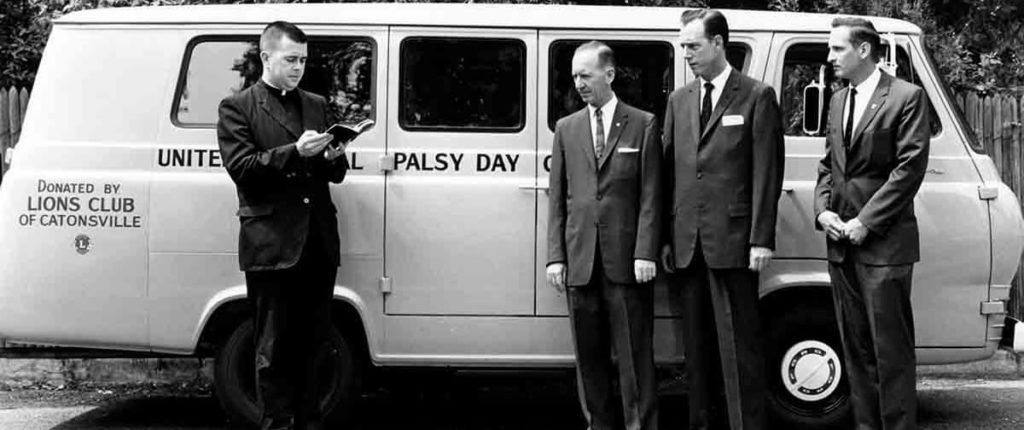
The fifth of six children of Richard and Katherine Kelly Burke, the monsignor was raised in a bustling home in a vibrant parish.
He was 6 when his sister, Helen, entered the Daughters of Charity. She taught for 51 years, including at the former Seton High School, 1965-83. Other role models came from St. Ambrose Parish, including Monsignor William Sauer, a friend of the family.
He also looked up to Billy Gaudreau, another St. Ambrose kid, and followed him to what was then Loyola High School. (Gaudreau joined the architecture firm founded by his father and designed a number of post-Vatican II churches in the archdiocese).
Monsignor Burke spent a year apiece at Loyola College and St. Charles, completed his undergraduate studies at St. Mary’s Seminary, and then earned bachelor’s degrees in philosophy and theology from the American College of the Catholic University of Louvain, Belgium, a seminary which had reopened after World War II.
“Otherwise, I wouldn’t have gotten beyond Highlandtown,” said Monsignor Burke, who initially crossed the Atlantic on the Queen Mary.
His parents attended his 1959 ordination, in Belgium. The young Father Burke then spent seven years as an associate pastor of St. Mark in Catonsville and four at St. Ann in Baltimore, which offered varied experiences.
“We had courses in pastoral theology, but you learned by doing,” Monsignor Burke said, contrasting his experience to later seminarians, who spend a year in a parish. “At St. Mark, you were busy all the time. There were four of us (priests), 11 nursing homes and Spring Grove State Hospital.”
One Saturday afternoon, while hearing confessions, he heard Monsignor Joseph Leary, the pastor, “a fine man,” speak up from the back of the church: “All of you in line for Father Burke go across the aisle with someone else.” That’s how the now-monsignor learned he was making a sick call to Spring Grove.
St. Ann, in Baltimore’s Barclay neighborhood, required similarly quick thinking in 1968, after the assasination of Rev. Dr. Martin Luther King Jr. plunged the city into riots. In 2012, Monsignor Burke told the Review of a Palm Sunday procession two days later, which was disrupted by a boy throwing a Molotov cocktail into a dry cleaners on Greenmount Avenue.
St. Ann became a food distribution center in an effort organized by now-Cardinal J. Francis Stafford, then head of Catholic Charities of Baltimore, and the late Father Richard T. Lawrence. By Wednesday of Holy Week, Monsignor Burke told the Review, the violence had subsided and the church experienced a “beautiful Easter Sunday.”
Monsignor Burke moved on to St. Mary, Star of the Sea, in South Baltimore, where he brought in a choir from historic St. Francis Xavier, America’s first Black parish. It moved some in his congregation, he told the Review in 2018, to “good” tears.
“That’s how you break it down, little by little,” Monsignor Burke said. “More was done in that hour and a half than if I had stood up and talked about racism for three days.”
Kindred spirits
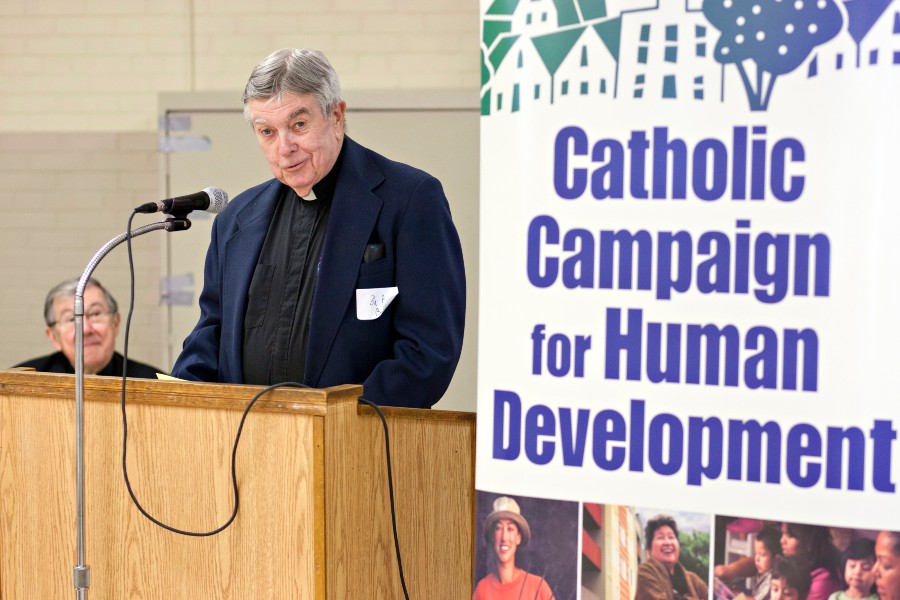
During his time in South Baltimore, Monsignor Burke was tapped to lead the local branch of CCHD. He has overseen the distribution of grants to various social programs which promote education, employment and literacy; headed the annual archdiocesan Social Ministry Convocation; and worked with similar organizations, such as BUILD (Baltimoreans United in Leadership Development).
He has recruited laypeople such as Glyndon Bailey, himself 98, and fellow priests such as Father Gerard J. Bowen, pastor of St. John the Evangelist in Columbia, among the few outside the city which has a presence at the annual CCHD luncheon, held at St. Francis of Assisi.
“Bill is responsible for my engagement in the work,” Father Bowen said. “Coming into the orbit of Bill and (the late auxiliary Bishop) Frank Murphy, they were close friends, like brothers in terms of their outlook on the world, especially respect (for) life and the dignity of all.”
Father Bowen’s parish internship in the mid-1970s was at St. Elizabeth of Hungary in Highlandtown, where Monsignor Burke was pastor.
“The doorbell would ring,” he said. “Bill would stop whatever he was doing and talk to the person, who typically needed help with the rent or food.”
The archdiocese held its 42nd annual Social Ministry Convocation in March. Monsignor Burke recruited Father Bowen to help in the organization of the third, in 1982.
“Bill introduced me to people, and let the goodness of the work itself take over,” Father Bowen said. “I got into it all, because of Bill’s example. When someone invites you into something they believe in, you take it seriously, and see it for the opportunity it is.”
At St. Francis of Assisi, Monsignor Burke entrusted the parish’s support of Our Daily Bread, the Franciscan Center and many other ministries to its pastoral associate of 30 years, Sister of Mercy Katherine Bell, who died in 2019.
Parish traditions include school
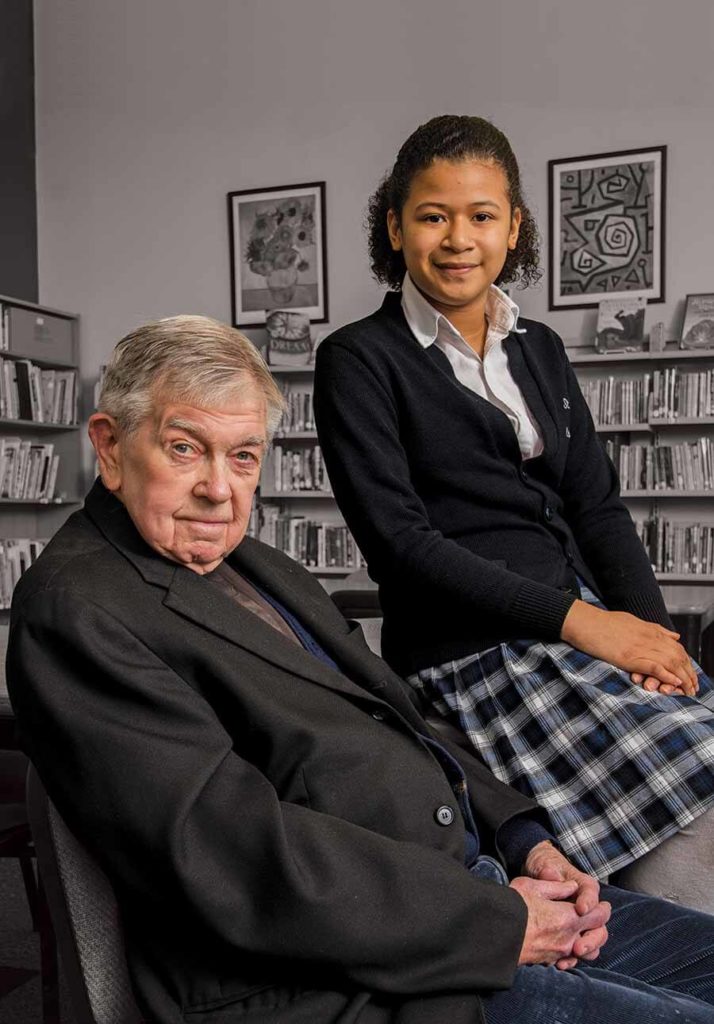
One of the things Monsignor Burke most missed during the pandemic were school Masses every Tuesday and Friday, as his decades at St. Francis of Assisi have been highlighted by the presence of a parish school.
In the late 1990s, a “Raise the Roof” campaign raised nearly $1 million for the addition of a third floor on the building at the corner of Harford Road and Chesterfield Avenue. That project hints at the persuasive powers of Monsignor Burke and his people.
According to a parish history published in 2002, on the occasion of its 75th jubilee, building funds included a grant from the Abell Foundation, its first to a non-public school. The honorary chairman was William Donald Schaefer, former governor of Maryland and mayor of Baltimore.
Mary Beth Lennon, president of Mercy High School, witnessed his advocacy during her stint on the board of St. Francis of Assisi School.
“Its mission ends,” she said, “with the statement, ‘not just a school, but a way of life.’ For Father Burke, St. Francis of Assisi School is central to the life of the parish. Everything he has done as pastor has reflected that vision. Father Burke is the greatest cheerleader and champion of the school and its students, and his leadership and unwavering support of Catholic education have inspired generations of SFA families.”
Those generations have enjoyed his presence at parish traditions such as chicken dinners, crab feasts, strawberry festivals, the sale of padded oysters and a pet blessing near the Oct. 4 feast of its namesake. The rectory’s residents have usually included a retriever or a similar working breed, including one named “Franco.”
“He has a great respect for the ordinariness of people’s lives,” Father Bowen said. “He is able to not miss the ‘little things.’”
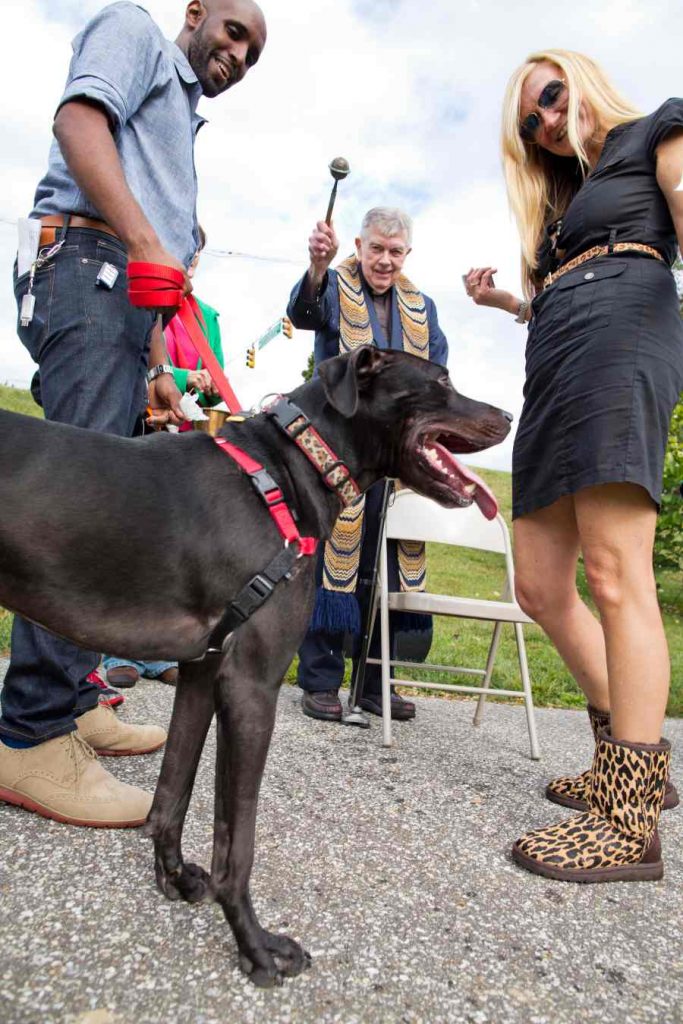
Father Bowen recalls vacationing with Monsignor Burke in Paris, where a young people’s choir brought a restaurant to a hush with an impromptu performance of “I’ll Be Seeing You.”
“Bill has told that story about that dinner again and again,” Father Bowen said. “It’s an example of how an ordinary situation gives us a superlative sense of humanity.”
When St. Francis of Assisi honored his 50 years as a priest in 2009, Monsignor Burke referenced that classic in his homily. The homage that followed included the sentiments of Father Bowen and Monsignor Richard J. Bozzelli, pastor of St. Bernardine in West Baltimore, also among the younger priests who have benefited from his mentorship.
At that celebration, Father Bowen described Monsignor Burke’s wry monotone as a “cross between John Wayne and Garrison Keillor,” spot on, given his assessment of his 41 years at St. Francis of Assisi: “It seems to have worked out well.”
In retirement, Monsignor Burke will reside at St. Pius X in Rodgers Forge.
A retirement celebration for Monsignor Burke will be held Sept. 19, from 2 p.m. to 6 p.m., at the Boumi Temple in Rosedale, 5050 King Ave. The cost is $25. For more information, telephone 410-235-5136 or 443-845-8235.
Email Paul McMullen at pmcmullen@CatholicReview.org
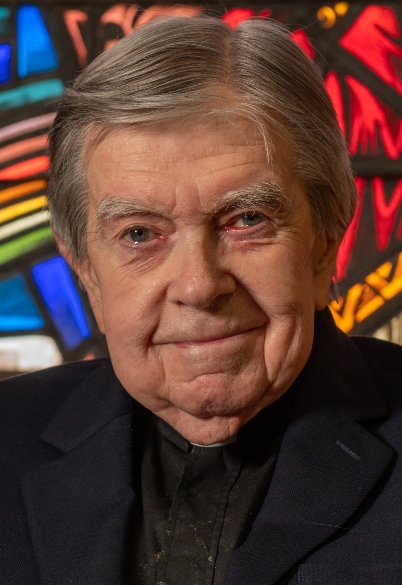
Monsignor William Burke
Born: Aug. 2, 1933
Home parish: St. Ambrose, Baltimore
Education: St. Ambrose School; Loyola High School, Towson; Loyola College; St. Mary’s Seminary, Baltimore; bachelor’s degrees in Philosophy and Theology, American College of the Catholic University, Louvain, Belgium
Ordained: June 28, 1959, in Louvain
Assignments: St. Mark, Catonsville, associate pastor, 1959-66; St. Ann, Baltimore, associate pastor, 1966-1970; St. Mary, Star of the Sea, Baltimore, administrator, 1970-74; St. Elizabeth of Hungary, Highlandtown, pastor, 1974-78; University of Maryland Baltimore, campus minister, 1978-80; Shrine of the Sacred Heart, Mount Washington, temporary administrator, 1980; St. Francis of Assisi, Baltimore, pastor, 1980-present; Catholic Campaign for Human Development, archdiocesan director, 1972-present
On his passion for social justice: “You’ve heard of the Ten Commandments and you’ve heard of the spiritual and corporal works of mercy that sort of define the Beatitudes. It’s all right there. How do you live it out? You knew you weren’t ordained just to celebrate Mass each day and take Communion to sick people. You were there beyond that, to listen, to understand, to be patient, but also, I think to be effective in bringing about change.”
Also see
Copyright © 2021 Catholic Review Media
